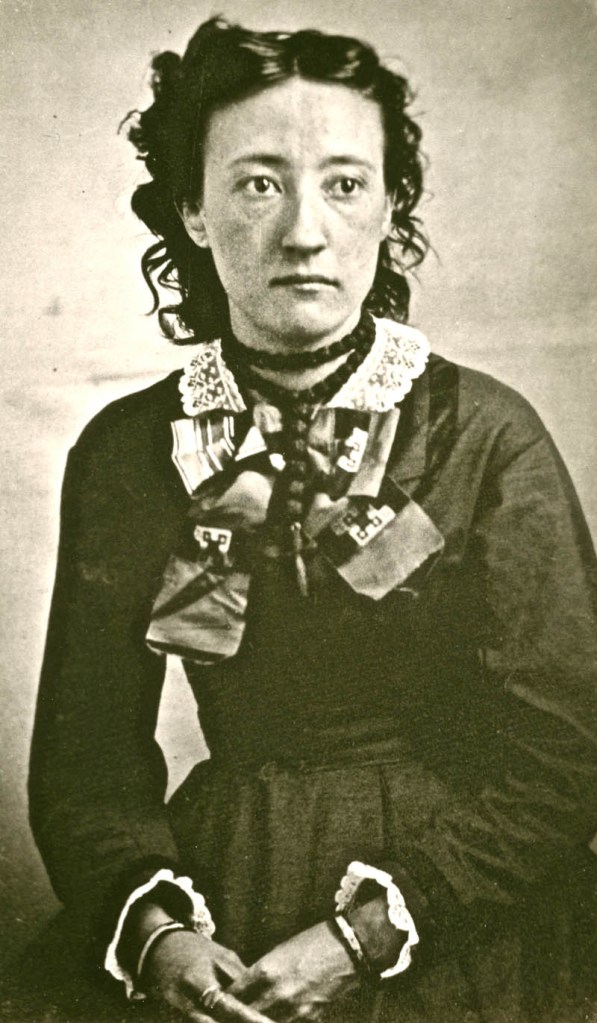BINGHAM — In the early 1830s, a group of travelers made their way down a dirt trail called the Canada Road, traveling from Quebec to areas across northern Maine.
They faced many hardships: cold winters, sickness and the deaths of family members.
More than 180 years later, their story survives and is being celebrated by a folk singer who grew up in Bingham.
“I wanted people to reflect on the unbelievable risks that were taken to settle these towns, to think of how much of what they built up is still in use by us today,” said Martha Sterling-Golden, a singer-songwriter who recently wrote a song about the immigrants’ journey.
Sterling-Golden, who now lives in Topsham, is also a member of the Old Canada Road Historical Society board of directors and is donating profits from the sale of her song, “Canada Road,” to the society.
The song was inspired by a letter written by John B. Smith, an early settler of The Forks, but comes from Sterling-Golden’s lyrical imagination and her family’s ties to the area.
Smith’s letter to the Legislature in 1838 asks for assistance and describes the difficulties of early settlers. Sterling-Golden, 58, said she found a copy of the old letter at the historical society last spring and was struck by a part that talked about a woman whose child had died during their travels.
“I knew I would write a song about that woman. To me she stands for the hardships people were willing to endure in hopes of finding a better life,” Sterling-Golden said.
For Sterling-Golden, who also has a daughter, she said the letter spoke to her emotions as a mother and that the song contains ties to her own life.
Her own ancestors were Irish immigrants to Quebec who came down the Canada Road to the Upper Kennebec Valley in the early 1800s, and they are also part of the song.
“In September of 1810 we sailed our way from Ireland, the two of us and dreams,” she sings in “Canada Road.”
Sterling-Golden said she grew up in a musical household in Bingham. Her mother studied voice and piano and her father taught himself to play the saxophone. For her 13th birthday, her mother gave her a guitar, which she remembers playing until her fingers bled. She loved poetry and first experimented with turning the poems of Willa Cather into folk songs.
After graduating from high school, Sterling-Golden traveled Massachusetts playing music. She eventually began working for nonprofit organizations, working her way up to becoming president of the Women’s Campaign School at Yale University. The group seeks to help women gain leadership roles around the world.
“I had a baby. I was working. I did volunteer work and I had no time to play,” she said.
Last year Sterling-Golden found the letter by Smith and decided to start song-writing again.
“It was a time in my life when I had lost a couple of people among my family and friends and it made me realize that I really needed to feed my spirit again,” she said.
Currently a student at the University of Southern Maine, she is also working on an album, “Norumbega Fault,” for release later this year. She said she isn’t sure whether the “Canada Road” song will be included.
“I really want to give that song back to the community and I want its proceeds to go to the historical society,” she said. “Bingham is a beautiful and hard place. It makes you strong to grow up there and it’s definitely been part of my creative evolution.”
In the song, she imagines what life would have been like for Smith or for her ancestors. “I worked and scrimped and saved to bring my family here, where we remain,” the lyrics say.
The artwork for the “Canada Road” CD comes from the historical society’s collection of photos and includes a portrait of Cordelia Brown, a settler of the Forks. Brown is not the woman in the letter, but her portrait spoke to Sterling-Golden, she said.
“It is a stark image and there is so much in her eyes. I didn’t know what she had been through, but you could tell there was pain there,” said Sterling-Golden, describing the first time she saw the picture.
Later, she said she found out that Brown also had lost a child.
“Reading the letter again, I immediately thought of her. She just captures the intensity and the drive of the people. They had to risk so much to come to a remote place with no idea they would even survive,” she said.
Rachel Ohm — 612-2368
rohm@mainetoday.com
Send questions/comments to the editors.






Success. Please wait for the page to reload. If the page does not reload within 5 seconds, please refresh the page.
Enter your email and password to access comments.
Hi, to comment on stories you must . This profile is in addition to your subscription and website login.
Already have a commenting profile? .
Invalid username/password.
Please check your email to confirm and complete your registration.
Only subscribers are eligible to post comments. Please subscribe or login first for digital access. Here’s why.
Use the form below to reset your password. When you've submitted your account email, we will send an email with a reset code.